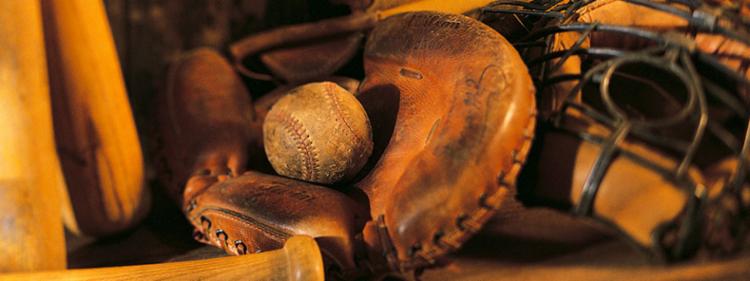Does My Home Insurance Cover My Sports Collection?

Sports fans – how safe are your collectables? Would your treasured baseball card collection survive a flood? What might happen to your Michael Jordan autographed basketball in a house fire? What if burglars swipe your signed Wayne Gretzky jersey?
These questions are not designed to make you paranoid about your sports memorabilia collection, but they do bring up an important concern that all too many sports fans overlook.
What would happen to your collection in a tragic event? Does your home insurance cover the value of your memorabilia?
Should I Really Be Worried About My Sports Memorabilia Being Stolen?
No one likes to think about it, but there are some very nasty people in this world who may want to steal your belongings. Consider these examples:
- Potomac, MD: Signed San Antonio Spurs basketballs and jerseys were stolen at 1:38 pm while the homeowners were out for a walk.
- Shoreham, VT: Dale Earnhardt collectible cars and personal checks, a baseball autographed by Ted Williams, and Ted Williams action figures were stolen during multiple burglaries.
- Fargo, ND: Over 100 items of baseball memorabilia valued at over $4,000 were stolen from a self-storage facility.
What Does Standard Homeowner’s Insurance Cover?
Homeowners insurance is designed to protect you from the loss of personal property. In theory, that should include your sports collectibles. In reality, things are not so simple. Unless your collectibles have been specifically scheduled, your insurance company may refuse to reimburse you for them.
Do not expect to get the full appraised value for them either. Reimbursements are based on your collectibles’ actual cash value, not their collectible or appraised value. That means that, if a disaster were to wipe out your collection, you would get far less than the true value back from your insurance company. In fact, you might only get back the amount you can prove with receipts that you originally paid for your collectibles instead of their current market value.
Of course, that is assuming you would get anything at all. That depends on how your collectibles are lost or damaged in the first place. In general, homeowners insurance policies cover damage from:
- Hurricanes
- Tornadoes
- Hail
- Wind
- Fire
- Theft
However, do not expect compensation from a standard policy if the damage is caused by flooding or earthquakes. Even if flooding was caused by a hurricane, it still counts as separate damage. That’s right – a flood could wipe out your baseball cards, wash away your signed bat and glove – and your homeowners insurance wouldn’t do a thing to help you recover their value.
What Insurance Options Are There For Sports Memorabilia?
Since standard homeowners insurance is not reliable when it comes to protecting your sports memorabilia, you need something extra. One option is to add additional coverage to your current homeowners policy. This saves you from the hassle of having to find another insurance company. You may be able to work up an extended policy with your agent easily.
On the other hand, it is nice to have a collectible policy that is specifically designed to protect the value of your one of a kind cards and jerseys. Specialty insurance companies offer policies that usually cover loss and damage by:
- Theft
- Breakage
- Mail loss
- Fire
- Flooding
- Natural Disasters
Collectible insurance policies still do have some exclusions, so be sure to carefully review any policy you are offered before making an agreement.
How Does Sports Memorabilia Insurance Work?
You do not need to keep a detailed inventory of every item in your collection to make your sports memorabilia insurance policy valid. There are two simple ways to keep your policy up to date and to avoid any issues in the unfortunate case of needing to file a claim:
- Inventory high value items: Any items that are appraised at over $5,000 should be inventoried. That will save you from getting into a dispute when the time comes to file a claim.
- Take pictures: This is not always required by insurance companies, but it is a good rule of thumb anyway. Photos help back up your claims and basically eliminate the chance that you will have to dispute things with the insurance company, a process that no one wants to go through.
What Information Do I Need to File a Claim?
When you buy insurance, you hope that you will never need it. Sadly, that catch-22 doesn’t always work out in your favor. If you ever have to file an insurance claim for your insurance memorabilia, you will need the following information:
- Personal contact information
- Policy number
- Date of the loss or damage
- Detailed report of the loss or damage including the location and any related events
- Records on the lost or damaged items such as photos, inventory sheets, police reports, and recent appraisals
- Total value of the lost or damaged items
Besides Insurance, What Else Can I Do To Protect My Collectibles?
While having a sports memorabilia insurance policy is a great way to protect the value of your collection, there are other ways to keep them safe.
- Use protective cases: Sports cards, jerseys, and other items can get damaged simply by the passage of time. Protect them by using cases designed to keep them from fading, molding, and decaying.
- Install a security system: Home security systems are great for making thieves think twice before swiping your memorabilia collection. As an added bonus, you may be able to convince your insurance company to lower your premiums when you let them know you have a security system in place.
- Get a fire safe: Protecting your special items from fire is also a good idea. Many of us believe that if a fire happens we will be able to grab our most important and valuable possessions, but that is often not the case. Even if a fire is quickly managed, smoke damage alone can be catastrophic.
- Do not broadcast the fact that you have a valuable collection: This is especially important online. Far too many people forget that everything they post online is public and can be viewed by anyone, including thieves. Never share your home address or the details of your collection on public forums or social networking sites.
Is your sports memorabilia truly important to you? Is it valuable? Is it unique? If so, it is definitely worth protecting. Get a specialty insurance policy or extend your homeowners policy to cover your collection and take preventative measures to keep them safe.
